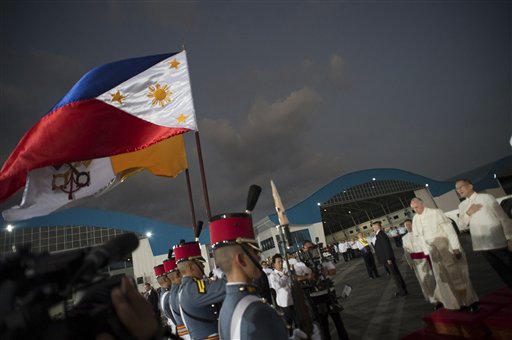Documentary, not yearbook, is visit’s chronicle

Pope Francis is flanked by Philippine President Benigno Aquino III, who broke protocol to welcome the Pontiff. as they stand in front of the Vatican and Philippines flags, upon arrival from Sri Lanka Thursday, Jan. 15, 2015 at suburban Pasay city south of Manila, Philippines. AP
MANILA, Philippines–To document Pope Francis’ visit, the Church is ditching the traditional yearbook in favor of a documentary.
The Catholic media hope the documentary to be aired on national TV next month will provide Filipinos a behind-the-scenes glimpse of the Pope’s four-day apostolic visit to the country.
“We will be focusing on the Filipinos’ reaction to the Pope,” said Fr. Emmanuel “Nono” Alfonso, SJ, who has been put in charge of the papal coverage and documentation by the Catholic Bishops’ Conference of the Philippines (CBCP).
The Pope arrived Thursday for a flurry of meetings with President Aquino, members of the clergy and religious, the youth and families, but the visit’s main highlight is his lunch with survivors of Supertyphoon “Yolanda” (international name: Haiyan) on Saturday.
He will conclude his visit with a Mass at Rizal Park in Manila on Sunday that is expected to draw millions of Catholics eager to catch a glimpse and hear the voice of the popular Pontiff.
Like the Vatican journalists, several teams of reporters would be hounding the Pope to document his events in Manila, then in Tacloban City, and back in Manila.
Mainstream media
Alfonso heads the team composed of representatives from such groups as Communications Foundation Asia, University of Santo Tomas, Colegio de San Juan de Letran, Bo Sanchez’s Kerygma, Family Rosary Crusade, Society of St. Paul and Don Bosco Seminary.
“One of our output is to come up with a documentary film on the Pope’s visit, which will be aired on mainstream media,” Alfonso, executive director of Jesuit Communications, said in an interview.
Copies of the documentary would be given to the TV networks for airing, possibly on the first Sunday of February.
Following Pope John Paul II’s visits in 1981 and 1995, the CBCP published a yearbook to refresh Filipinos about the visit.
Prolong the joy
“This time around we’re more visual than print. They want a documentary film,” Alfonso said, recalling that in 1995, YouTube didn’t exist yet. “This will in effect prolong the joy of the visit.”
This could be shared on YouTube, Facebook and other social networks, he said.
“If you have something digital, this can go widespread than having it in print. This is more accessible,” Alfonso, who hosts the talk show “Usapang Kapatid” with Sr. Bubbles Bandojo, RC, said on dzMM.
He agreed with predictions that the concluding Mass would draw huge crowds.
“Pope Francis’ message is for the poor. He’s very close to the poor. Forty percent of the Filipinos are poor; they would resonate more with this Pope,” he said.
“Even the images are very powerful. Somebody is telling me, ‘What if he’s kissing people?’ When Jesus lived, he did these symbolical acts, yet the Christian faith has existed for centuries based on the life of this Jew,” he added.